Posts Tagged ‘black-out’
-
THE SELLING GAME
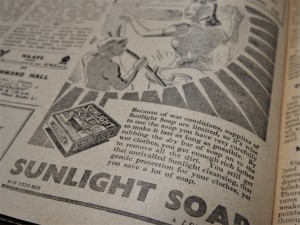 Advertising is said to reflect the societal tastes, beliefs and norms. By looking back at the adverts that were published in the Times of Malta at the end of the years 1939 to 1944, this becomes very clear. Yet even their absence during the days of war have much to say.
Advertising is said to reflect the societal tastes, beliefs and norms. By looking back at the adverts that were published in the Times of Malta at the end of the years 1939 to 1944, this becomes very clear. Yet even their absence during the days of war have much to say.There are whole studies and much research behind advertising. Adverts are used as a form of communication intended to convince an audience to purchase or take some action upon products, ideals or services. Their regularity aim to impact on memory to create a sense of familiarity and trust to buy those products.
Indeed, while turning the pages of November – December 1939 and 1940 of the Times of Malta, it is evident that a group of particular brands are always featuring. Most relate to health, beauty, alcohol, insurance, entertainment (mainly cinema), fashion and gifts.
Health adverts at the time generally focus on irritability of the stomach, laxatives, cold and fever, rheumatism, eczema, fatigue and sleeplessness. The message on the adverts is mainly delivered through drawings and long descriptions about the benefits of using the products.
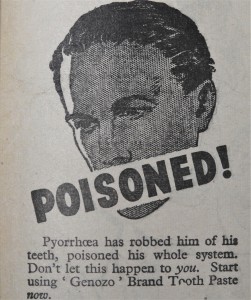 The text is generally presented in the form of a conversation – “Why continue to be agonised by Terrible Headaches, Niggling Nerve Pains, Black Depression, and Heavy-Limbed Lassitude?” – reads the introduction of an advert for tonic tablets.
The text is generally presented in the form of a conversation – “Why continue to be agonised by Terrible Headaches, Niggling Nerve Pains, Black Depression, and Heavy-Limbed Lassitude?” – reads the introduction of an advert for tonic tablets.“Do you realise the danger? Impure blood causes disease.” – says another advert selling a ‘blood mixture’ as ailment against rheumatism, lumbago, eczema, boils and pimples.
Communication with the readers is stark and direct – The word “Poisoned!” in capital black letters runs over the mouth of a man in the advert of a toothpaste. “Pyorrhoea has robbed him of his teeth, poisoned his whole system. Don’t let this happen to you.”
“Is running a house too much for you?” reads the title of an energy drink. “Do you feel that the cares of the household get you down and managing your servants is a strain?”
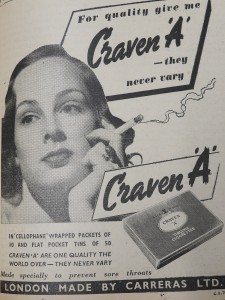 The quantity of adverts focusing on health issues form quite a big chunk of the advertising at the time. However, ironically, these are accompanied by cigarette adverts, one of which shows a beautiful young woman with a cigarette in her hand. A section of the advert text reads – “Made specially to prevent sore throats.”
The quantity of adverts focusing on health issues form quite a big chunk of the advertising at the time. However, ironically, these are accompanied by cigarette adverts, one of which shows a beautiful young woman with a cigarette in her hand. A section of the advert text reads – “Made specially to prevent sore throats.”Some of the adverts published at the time will certainly be unacceptable nowadays. Social class differences, sexism and offensive messages are quite typical.
“Women who belong to the 1st sleep group never grow old before their time. There are 3 groups. Which do you belong to?” – asks an advert selling Horlicks. “Most attractive women belong to the 1st sleep group.” – states another one. “Men who are sure of themselves belong to the 1st sleep group.” – and – “Men who get on in life nearly all belong to the 1st sleep group”.
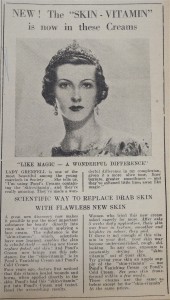 “Don’t look old! Tint those grey hairs with Shadeine.” – jumps at you an advert selling hair colour.
“Don’t look old! Tint those grey hairs with Shadeine.” – jumps at you an advert selling hair colour.Advertisements can influence strongly how we perceive things around us. By showing a high social class user of a product, the advert creates a longing or a pressure to purchase that item in order to belong to that level of society.
A skin-vitamin cream portrays the drawing of a beautiful lady, all dressed up in perfect make-up, set-up hair, a pair of lovely earrings and a crown. – “Lady Grenfell is one of the most beautiful among the young marrieds in Society…. She tells us, ‘I’m using Pond’s Creams containing the ‘skin-vitamin’, and they’re really amazing.”
“Many army and royal navy officers enjoy the comfort of our hand-made footwear. Why Not you? Sir.” – entices an advert showing the drawing of a highly elegant man sitting in a luxurious armchair while a shoe-maker sits on a stool to help him try on a new pair of shiny “Best English leather”.
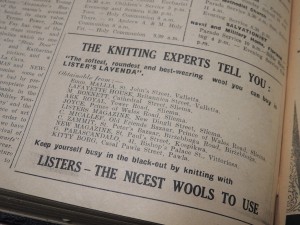 A shade of the effects of the Second World War, even though not yet happening in Malta is already present in adverts of 1939.
A shade of the effects of the Second World War, even though not yet happening in Malta is already present in adverts of 1939.“Keep yourself busy in the black-out by knitting with Listers – the nicest wool to use.” – advices an advert. “Bernards suggest that you give sensible gifts this Christmas. Such gifts as shirts, pyjamas, handkerchiefs, ties, socks, gloves and wool-slipovers all make very acceptable presents.” – recommends another one.
Not only adverts diminish in 1941 during the war days in Malta. Even the newspaper itself shrivels to a few pages although being published daily.
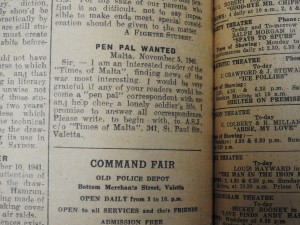 “Test your gas mask. Gas Chamber at Castile Place today.” – reads a warning advert on the front page of the Times of Malta on Tuesday, November 4, 1941. “There is no better way of ensuring that the respirator is still properly functioning than by putting it on and entering the gas chamber.”
“Test your gas mask. Gas Chamber at Castile Place today.” – reads a warning advert on the front page of the Times of Malta on Tuesday, November 4, 1941. “There is no better way of ensuring that the respirator is still properly functioning than by putting it on and entering the gas chamber.”Amid the difficulties of war, an advert speaks out the request for a pen pal – “I am an interested reader of the “Times of Malta”, finding news of the war most interesting. I would be very grateful if any of your readers would become a “pen pal” correspondent with me and help cheer a lonely soldier’s life.”
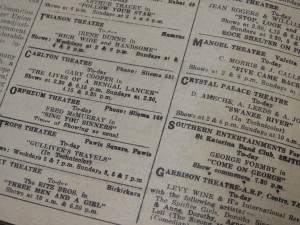 A considerable decrease of adverts continues in 1942. Alcohol adverts drop out completely. Cinema continues regularly in the following theatres – Manoel and Coliseum in Valletta, Gaiety, Majestic, Carlton and Orpheum in Sliema, Odeon, Thrianon and Rex in Ħamrun, Prince in Birkirkara, Buckingham and Royal in Żabbar, and Empire in Paola.
A considerable decrease of adverts continues in 1942. Alcohol adverts drop out completely. Cinema continues regularly in the following theatres – Manoel and Coliseum in Valletta, Gaiety, Majestic, Carlton and Orpheum in Sliema, Odeon, Thrianon and Rex in Ħamrun, Prince in Birkirkara, Buckingham and Royal in Żabbar, and Empire in Paola.“What do I do…. about the black market?” runs an advert issued by the Information Office. A Wartime Reminder advert issued by the same Office reminds people that “Imported Fuel is used for pumping Water. Reduced consumption of water saves Fuel. A saving in Fuel saves Freight, (and) Saving in freight helps to win the War.”
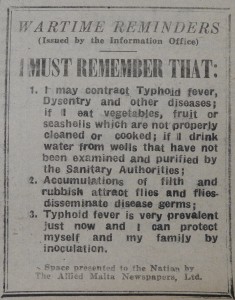 Another Wartime Reminder recommends the adequate washing of vegetables, fruit and seashells, and their proper cooking while warning against the accumulation of filth, since these may lead to Typhoid fever and Dysentry. Inoculation against the Typhoid fever is also advocated.
Another Wartime Reminder recommends the adequate washing of vegetables, fruit and seashells, and their proper cooking while warning against the accumulation of filth, since these may lead to Typhoid fever and Dysentry. Inoculation against the Typhoid fever is also advocated.The siege on the Maltese Islands effectively ended in November 1942. Yet adverts show that life took time to return to normal especially since the Second World War had not yet ended in other countries.
An advert issued by the N.F.U advices to eat cabbage and cauliflower to keep fit. Another advert informs its clientele that “Because of war conditions, supplies of Sunlight Soap are limited, so it’s wise to use the soap you have very carefully to make it last as long as possible.”
Even tennis balls were restored instead of purchasing new ones – “Hand in your old Tennis Balls to any of the Sports Dealers named below, who will forward them to Slazengers for renovation by a special process which includes reinflation and provision of a new outside cover.”
During the days of war, a few selected companies such as Bovril, managed to stay in the public eye through advertisements. “Makes all the difference between bread and butter.” The Bovril advert states. “A 4-oz. Bottle of Bovril makes over 100 delicious sandwiches.”
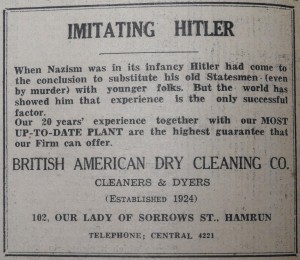 Other adverts such as the one for Dettol portrayed the company’s involvement in the war efforts and reminded that the product should be used with “measured care” in order to keep the supply flowing.
Other adverts such as the one for Dettol portrayed the company’s involvement in the war efforts and reminded that the product should be used with “measured care” in order to keep the supply flowing.Marketers have always adapted to changing business demands when it comes to creating new advertisements. However, there are moments when their creativity is quite shocking – “Imitating Hitler” screams the title in bold capital letters of the British American Dry Cleaning Co.
(This feature was published in the Christmas Supplement issued with the Times of Malta dated 1st December 2019)
-
LIGHTS OUT FOR CHRISTMAS
Christmas time and the days preceding it are generally associated with colour, light, optimism and fun. Yet this was not the case in 1939 when the Christmas season became synonymous with gloom, darkness, uncertainty and fear.
On 18 September 1939, a table showing the duration of the ‘Official Night’ was published in Government Notice No. 459 in The Malta Government Gazette. This table included each day of each month and the beginning and end of what was to be considered as the official night hours. Such instructions formed part of the Malta Defence Regulations, 1939, which aimed to protect the Maltese Islands and its inhabitants as World War II ravaged in other countries.
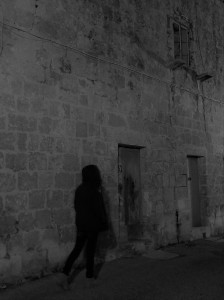 Two days later, on 20 September 1939, Government Notice No. 473 issued the Lights Restriction Order which was effective from that day. The directions of this Order had to be observed between midnight and 4:30am on every day of the week, and also between 10:00pm and midnight on Fridays. During these times, all lights in any building had to be masked to be invisible from the sea and from the air. No lights, other than lights authorised by the competent authority, were permitted in any open spaces whether private or public, in yards, roofs or open verandas. The use of illuminated lettering or signs in any shops were prohibited unless authorised by the Commissioner of Police or the competent authority. The traffic of motor vehicles during these hours was banned and any vehicles which did not comply with these provisions could be stopped and detained until 6:00am. Obviously, all fireworks were also prohibited.
Two days later, on 20 September 1939, Government Notice No. 473 issued the Lights Restriction Order which was effective from that day. The directions of this Order had to be observed between midnight and 4:30am on every day of the week, and also between 10:00pm and midnight on Fridays. During these times, all lights in any building had to be masked to be invisible from the sea and from the air. No lights, other than lights authorised by the competent authority, were permitted in any open spaces whether private or public, in yards, roofs or open verandas. The use of illuminated lettering or signs in any shops were prohibited unless authorised by the Commissioner of Police or the competent authority. The traffic of motor vehicles during these hours was banned and any vehicles which did not comply with these provisions could be stopped and detained until 6:00am. Obviously, all fireworks were also prohibited.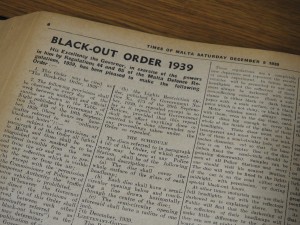 An Air-Raid Precautions Order was communicated in Government Notice No. 504 on 4 October 1939. Eventually on 9 December 1939, The Times of Malta published the provisions of The Black-Out Order, 1939, which had to be observed on every day of the week between midnight and the official sunrise. During these hours, all the lights on the Islands had to be extinguished or masked as to be rendered invisible from the sea and from the air. Special Black-Out hours could also be determined when necessary.
An Air-Raid Precautions Order was communicated in Government Notice No. 504 on 4 October 1939. Eventually on 9 December 1939, The Times of Malta published the provisions of The Black-Out Order, 1939, which had to be observed on every day of the week between midnight and the official sunrise. During these hours, all the lights on the Islands had to be extinguished or masked as to be rendered invisible from the sea and from the air. Special Black-Out hours could also be determined when necessary. As part of the Black-Out Order, from 14 December 1939, all motor vehicles which had to travel at night, other than those belonging to His Majesty’s service, had to have their bulbs removed from their lamps. Opaque cardboard discs were to be fixed to the lights of the vehicles and the reflectors’ surface had to be covered with a non-reflecting substance. A white disc had to be affixed at the back of all motor vehicles at a height of three feet from the ground to make them visible on the roads. Traffic of motor vehicles during the black-out was prohibited except for those who obtained permission from the Commissioner of Police or a competent authority.
Another notice which appeared on The Times of Malta of the 9 December 1939 urged the inhabitants to comply with these regulations for their own safety. People were recommended to stay at home and to avoid going out in the darkness. Those who needed to get out were advised to walk on the right-hand side of the road to face oncoming traffic and to carry with them a white object to make them more visible to drivers. Owners of goats were informed to keep their animals off the road at night. On the other hand, drivers were cautioned to drive very slowly and with great care.
Measures were being taken to prepare the people how to take the necessary precautions in preparation of an expected war. Black-outs intended to prevent crews of enemy aircraft from being able to identify their targets by sight. Nonetheless, these precautionary provisions proved to be one of the more unpleasant aspects of war, disrupting many civilian activities and causing widespread grumbling and lower morale.
The Times of Malta of 13 December 1939 reports that some misapprehension had arisen among that section of the public who had to rise early for work and travel by early buses, since it was not clear at what time the bus service started. Indeed, all buses were to continue their usual service provided that they adhered to the regulations regarding headlights and lights, including the inside of the vehicles which had to remain in darkness.
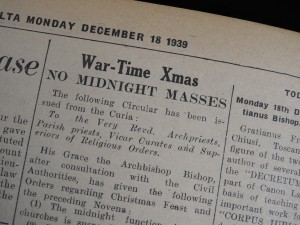 Even though the Maltese Islands were not yet directly involved in war, a foreboding atmosphere crept its way into the lives of people. As if matters were not yet miserable enough, a Bishop’s Circular which was published on The Times of Malta of 17 December 1939 declared that the Christmas midnight function in the churches was to be suspended. The Novena and feast functions could be celebrated from 4:00am onwards provided that no lights were visible from the outside. Those churches which required singers and musicians from far places for the early Christmas function had to apply to the Commissioner of Police for the necessary permits to travel. While it was permissible to give a small sign to the faithful by the ringing of bells for the function of the Novena and Christmas Eve, this had to be done according to predetermined rules.
Even though the Maltese Islands were not yet directly involved in war, a foreboding atmosphere crept its way into the lives of people. As if matters were not yet miserable enough, a Bishop’s Circular which was published on The Times of Malta of 17 December 1939 declared that the Christmas midnight function in the churches was to be suspended. The Novena and feast functions could be celebrated from 4:00am onwards provided that no lights were visible from the outside. Those churches which required singers and musicians from far places for the early Christmas function had to apply to the Commissioner of Police for the necessary permits to travel. While it was permissible to give a small sign to the faithful by the ringing of bells for the function of the Novena and Christmas Eve, this had to be done according to predetermined rules.Albeit the continuous warnings and pleas to adhere strictly to the black-out orders, it seemed that not everyone was following the rules. An announcement on The Times of Malta of the 20 December 1939 issued by the Lieutenant’s Government Office advised the public that the black-out on the night of December 15-16 was not entirely satisfactory, and that there were several lights showing in the Valletta, Sliema, Hamrun, Cospicua and Naxxar districts. Several lights were only put out as aircraft passed overhead. This notice pointed out also that a section of the public could still have been unaware of the black-out rules since they seemed to have been published only on The Times of Malta and Il-Berqa newspapers. Illiterate persons would therefore have had no way of being forewarned except by hearsay. Therefore, a siren warning which was different from the Air-Raid alarm signal, was recommended to be given throughout the islands at sunset.
Letters by readers in the Correspondence section of The Times of Malta of the 20 and 21 December 1939 vent their frustration and contempt at those who were not taking these black-out precautions seriously:
“Many people rather irresponsibly remark that they do not quite see the use of strict black-outs when Germany is at such a distance away. The reply is that precaution is better than cure. I am sure that these people will think very different if they find one day a German bomb dropping at their door-step or in their backyard, just because some stray lights guided an enemy to an objective.” Signed ‘Common-Sense’.
“I am sure that a number of law-abiding citizens in these islands feel that the time has come for coercion to replace coaxing. Those people who scorn to comply with reasonable regulations are either knaves or fools and most dangerous to the community in war time; they should be under lock and key for the duration of the war: either in jail or in a lunatic asylum. The pathetic appeals made by the authorities are becoming nauseating.” Signed Lieutenant Colonel (retired) H. M Marshall.
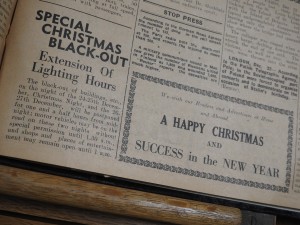 Special Black-Out arrangements for Christmas and New Year, published on The Times of Malta of the 23 and 30 December 1939, informed the public that the black-out of buildings on the nights of 24 – 27 December and 30 December – 1 January were to be postponed for one and a half hours from midnight. On these nights, motor vehicles were allowed on the road without requiring special permission until 1:30am, and shops and places of entertainment could remain open until 1:00am.
Special Black-Out arrangements for Christmas and New Year, published on The Times of Malta of the 23 and 30 December 1939, informed the public that the black-out of buildings on the nights of 24 – 27 December and 30 December – 1 January were to be postponed for one and a half hours from midnight. On these nights, motor vehicles were allowed on the road without requiring special permission until 1:30am, and shops and places of entertainment could remain open until 1:00am.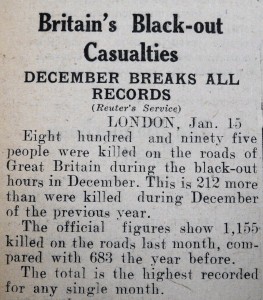 Possibly few had considered that light could be their enemy until it became essential to extinguish it. There was no mention of accidents or fatalities due to the black-out on the Islands in the December’s Times of Malta newspapers. However, reports from Great Britain relating to the high increase in road fatalities during the night were quite shocking. On 13 December 1939, the British Official Press stated that road fatalities had increased considerably from September to November. Yet the worst scenario took place in December, as reported by the Reuter’s Service on 16 January 1940, when 895 people were killed on the roads of Great Britain during the black-out hours. This was 212 more than those who were killed during December of the previous year.
Possibly few had considered that light could be their enemy until it became essential to extinguish it. There was no mention of accidents or fatalities due to the black-out on the Islands in the December’s Times of Malta newspapers. However, reports from Great Britain relating to the high increase in road fatalities during the night were quite shocking. On 13 December 1939, the British Official Press stated that road fatalities had increased considerably from September to November. Yet the worst scenario took place in December, as reported by the Reuter’s Service on 16 January 1940, when 895 people were killed on the roads of Great Britain during the black-out hours. This was 212 more than those who were killed during December of the previous year.This was surely a strange Christmas to the Maltese people who are accustomed to celebrate these days in a profuse way. Although through no fault of their own, they were involved in war and they had to adapt to war conditions. Alas, much worse was yet to come.
(This article was published in the Christmas Times magazine issued with The Times of Malta dated 13 December 2017)
Travelogue
Archives
| M | T | W | T | F | S | S |
|---|---|---|---|---|---|---|
| « Jan | ||||||
| 1 | 2 | 3 | 4 | 5 | 6 | 7 |
| 8 | 9 | 10 | 11 | 12 | 13 | 14 |
| 15 | 16 | 17 | 18 | 19 | 20 | 21 |
| 22 | 23 | 24 | 25 | 26 | 27 | 28 |
| 29 | 30 | 31 | ||||
Recent Posts
- A MATTER OF FATE
- MALTA’S PREHISTORIC TREASURES
- THE MAGIC IS IN THE DETAIL
- THE SELLING GAME
- NEVER FORGOTTEN
- Ġrajjiet mhux mitmuma – 35 sena mit-Traġedja tal-Patrol Boat C23
- AN UNEXPECTED VISIT
- THE SISTERS OF THE CRIB
Comments
- Pauline Harkins on Novella – Li kieku stajt!
- admin on IL-KARNIVAL TRAĠIKU TAL-1823
- Albert on IL-KARNIVAL TRAĠIKU TAL-1823
- Martin Ratcliffe on Love in the time of war
- admin on 24 SENA ILU: IT-TRAĠEDJA TAL-PATROL BOAT C23